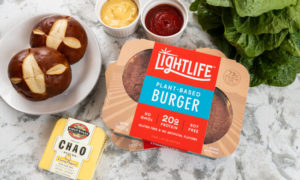Plant-based meats taking off as consumers seek alternatives to real thing
Jonah Goldman was about 10 years old when he went full-out vegetarian after learning — and being horrified by — how animals were conventionally mass raised and slaughtered to provide consumers with meat at the grocery store.
He talked his entire family into swearing off meat, too.
Goldman went on to study political science in college, focusing on food policy and security, and took an internship at Beyond Meat in 2013. At that time, the fledgling company had launched soy-based chicken strips as it focused on research and development to expand its offerings, perfect quality and build reach and production.
He got his family interested in the startup and his father joined the board of directors. Goldman himself went on to spend four years in Israel learning about sustainable agriculture techniques, then returned to work for a food rescue organization and compostable packaging startup. And he never lost his enthusiasm for Beyond Meat founder Ethan Brown’s vision to offer consumers a replacement for some of the meat in their diets without sacrificing taste or quality.
Beyond Meat
As Brown said during a 2017 National Public Radio podcast, he started out with a strong belief that the things that make up meat — amino acids, lipids, a small amount of carbohydrates, trace minerals and water — are not exclusive to animals.
“They’re all present in the plant kingdom,” he said. “Animals are running it through their system, creating muscle.”
His premise was: “Why can’t we take … and reorganize it into the structure of muscle?”

Beyond Meat rolled out its signature Beyond Burger in 2016. A new and improved Beyond Burger was introduced earlier in 2019. It’s made from a blend of peas, mung bean and rice proteins to add fiber and texture. Beets provide the hue of meat. Apple extract goes in to help plant-based meats brown. The company also added a marbling effect similar to the real thing.
Beyond Meat says it’s the first plant-based burger that looks, cooks and satisfies like beef without GMOs, soy or gluten.
Reuters reports that Beyond Meat’s sales have increased fivefold since Beyond Burger hit the marketplace in 2016. The product is turning up on menus of fast food chains and restaurants across the country — 53,000 and counting, according to a company spokeswoman who declined to comment on sales figures. Besides early supporter Whole Foods, it’s in major grocery store chains, often displayed next to real chicken and steak.
Now Beyond Burger is one of the key menu items at the new PLNT Burger restaurant that “Top Chef” finalist Chef Spike Mendelsohn just opened inside a Silver Springs, Maryland Whole Foods in September. Goldman, who is now PLNT Burger’s director of strategic marketing, said people were lining up to get in during its first weeks. The entire PLNT Burger menu is plant-based.
“It has all of the pros of meat without any of the cons,” Goldman said.
Where the action is
In July 2019, the Plant Based Food Association and Good Food Institute released data that showed U.S. retail sales of plant-based foods had grown 11% over the previous year, bringing the total U.S. plant-based market value to $4.5 billion. Since April 2017, plant-based food sales had climbed 31%, with unit sales up 8.5%.
“Plant-based foods are a growth engine, significantly outpacing overall grocery sales,” said Julie Emmett, Plant Based Foods Association senior director of retail partnerships, in a summary of the research.
The meat category is among the leading drivers of plant-based sales, with the others being milks and dairy, including cheese, yogurt and ice cream. Refrigerated plant-based meat is driving category growth with sales up 37%, the data showed.
Michael Robbins, communications consultant for the Plant Based Foods Association said the “flexitarian movement” is a big driver of the category’s growth. He described flexitarian as “the desire by individuals for a whole variety of reasons to reduce their consumption of animal products.”
“I don’t know when flexitarian became a thing, but it’s definitely a thing now,” he added.
Robbins couldn’t say how many fast food outlets are offering plant-based meats as a menu option, but those that do made a strategic choice.
“From Burger King to Tim Horton’s and White Castle and Del Taco, retailers and fast food companies don’t do these things randomly,” Robbins said. “They’re seeing proprietary data that shows this is what consumers want.”
Ramped-up demand
For more than 30 years, the family-owned Sunshine Burger, headquartered in Wisconsin, has been producing organic veggie burgers made with fresh ingredients that range from carrots and fresh herbs to onions, garlic, mushrooms and other items like brown rice and sunflower seeds, depending on the product. General Manager Cole Jones said the company’s strongest supporters have traditionally been dedicated vegans, though that’s changing.
“We do see a growing number of flexitarians gravitating toward our super-clean ingredients,” he said.
While the category has broadened to include other options besides burgers — nuggets, strips, crumbles, etc. — he noted that “the growth in plant-based burgers has been biggest with the meat analogs, which were engineered to appeal to omnivores.”

In April, Chicago-based Greenleaf Foods — with brands including Lightlife Foods and Field Roast Grain Meat — announced plans to build what it says is North America’s largest plant-based protein manufacturing facility in Shelbyville, Indiana. Expected to be operational by late 2020, the 230,000-square-foot facility will more than double production capacity, which the company said is needed to meet “surging consumer demand.”
“Only 3% of the population is made up by vegans and vegetarians, and while that number continues to grow, so do the number of Americans embracing a plant-based or flexitarian lifestyle,” said Dan Curtin, Greenleaf president and CEO. “It’s from the flexitarians that we’re seeing the most growth in demand for protein alternatives that deliver the same texture, taste and experience of traditional meat.”
Lightlife and Field Roast are in more than 30,000 retail locations across the U.S. and Canada. Those include Acme, Albertsons, Haggen, Jewel, Pavilions, Safeway, Vons, Wegmans, Sprouts and Fresh Thyme, with others coming on board in the months ahead, Curtin said. Lightlife is also in more than 1,000 restaurants and foodservice locations across the U.S. and Canada, including Chicago’s Soldier Field and the Memorial Coliseum in Los Angeles.
Field Roast is in hundreds of restaurants and foodservice locations across the U.S. and Canada as well.
The company also announced a partnership with Dot Foods, the U.S.’s largest food industry redistributor, in May, which made the products available to 4,500 distribution customers representing foodservice, retail and convenience.
In January, the company’s Lightlife Burger, ground Italian sausage and bratwurst sausage were launched as part of a new pea protein-based product line that was engineered to deliver the sensory experience that consumers desire. The burger has no GMOs, soy or gluten.
This past summer, California-based Impossible Foods reported that it received the all clear from the Food and Drug Administration to use an ingredient called soy leghemoglobin in its plant-based burger. It carries an iron-containing molecule that is the “magic ingredient that makes meat taste like meat,” according to a news release.
The company introduced its first product, the Impossible Burger, in 2016. It’s now on the menu in about 10,000 restaurants in the U.S., Hong Kong, Singapore and Macau. Its Impossible Whopper hit Burger King outlets in August.
Impossible Foods also reported it was set to launch the Impossible Burger in some retail outlets in September 2019.
— By Kathy Gibbons, contributing writer
Top photo — A burger using Lightlife’s plant-based meat. Photo: Lightlife Foods
RELATED: More photos of plant-based meats







